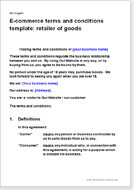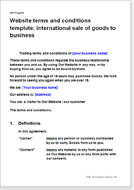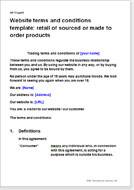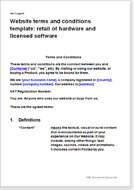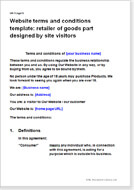Website terms: ecommerce & service providers
The following are terms for websites that sell goods or services (or a combination of both). They provide both an acceptable use policy for visitors and a contract for sale.
E-commerce terms and conditions template: retailer of goods
These e-commerce terms and conditions are suitable for most online retailers. The exact type of product does not matter provided that it is physical (rather than downloaded).
You may sell a single niche product to customers in the UK, or you may sell thousands of product lines to customers all over the world.
The document complies fully with the latest consumer protection law without compromising your legal rights if you also sell to business customers.
Examples of businesses that would use these T&C:
- web-based shops (for example, specialising in a niche product line such as headphones or garden furniture)
- bicks and mortar" shops with an e-commerce enabled website
- manufacturers who sell directly to the public via their sites
- wholesalers, selling mainly goods in bulk to businesses but possibly also single units to individuals)
Website terms and conditions template: international sale of goods to business
These are terms of use that also additionally incorporate terms of sale for purchases made from the website.
They are for a business that sells goods only to other businesses, such as:
- a wholesale supplier to a trade (such as a building supplies merchant)
- a manufacturer that sells components used in a product made and sold by another manufacturer
Your customers could be located in any country. These terms and conditions include provisions for sale abroad as well as within the UK.
The template includes a number of options for:
- payment arrangements: online or by prior arrangement
- delivery: choice of full set of Incoterms and other options
The document is suitable for merchants of all sizes, from newly established sole traders selling a single product to companies with extensive product lines.
Website terms and conditions template: retail of sourced or made to order products
These are terms and conditions for a online retailer that sells goods that are sourced, created or customised to order for individual customers.
You may exclusively sell through your site, or you may also operate through an "bricks-and-mortar" shop.
For example, you may:
- "source to order", finding a specialist product on demand for a customer
- make or adjust products to order, such as clothing or print photographs
These T&C comply with the latest consumer law allowing you to sell to consumers as well as businesses. Your customers might be in the UK or abroad.
Website terms and conditions template: retail of hardware and licensed software
This document should be used by a business that sells products from a website, all or some of which are sold with a licence to use software that the retailer has developed or owns.
The software should be sold in hard copy and packaged alongside the product, not be a separate download.
Not all your products that you sell have to use your software for this template to be suitable - you can sell some that do, and some that don't.
The users of this template are most likely either to be software developers that sell hardware products that are compatible with their software, or hardware manufacturers that have developed software for their products. For example:
- a manufacturer of cameras who wishes to provide its own editing software for use the product "out of the box"
- a manufacturer of programmable toy robots that require specialised software produced by the manufacturer to be installed on a PC in order to load customer-written code onto the robot
- a developer of GPS mapping software that can be used with a variety of third party devices that wishes to sell some of the devices alongside its own products from its website
- developers of contactless payment system software that requires particular hardware to operate
The terms are easy to adapt to the way your business sells, and suitable for selling internationally.
Inclusion of a suitably limited licence for the software protects your intellectual property rights.
Website terms and conditions template: retailer of goods part designed by site visitors
These are website terms written for online shops that sell products where part of the design is contributed by visitors or customers.
The retailer is likely to buy or manufacture 'white label' products then enhance them with designs suggested by visitors.
The products could be anything: from prints of artwork to clothing to laptop covers.
The incentive for the visitor to submit his designs is his satisfaction that his design is being used. He gives up his intellectual property rights. Because of technical legal reasons relating to consumer law we have not included options where free products are given in return, or where a royalty fee is paid. However, any business orientated retailer who isn't too worried about the technical application of the law could bend the rules, for example, by occasionally sending samples without notice to 'product testers' who happen to have part designed a product.
Your customers are consumers (private individuals) or other businesses or both, but they are not further distributors or retailers of your product.

If the document isn’t right for your circumstances for any reason, just tell us and we’ll refund you in full immediately.

We avoid legal terminology unless necessary. Plain English makes our documents easy to understand, easy to edit and more likely to be accepted.

You don’t need legal knowledge to use our documents. We explain what to edit and how in the guidance notes included at the end of the document.

Email us with questions about editing your document. Use our Lawyer Assist service if you’d like our legal team to check your document will do as you intend.

Our documents comply with the latest relevant law. Our lawyers regularly review how new law affects each document in our library.
Terms that protect your e-commerce enabled website
Because your terms and conditions are your contract with your client or customer, and because consumers have so much legal protection when shopping online, it is very important to get them right.
If your T&C don’t cover certain matters, it might be not just that you don’t have the same rights in law that you could have, but you could be breaking the law, with the possibility of being fined.
What we include in all these documents
Our terms cover both use of the website as a visitor – an Acceptable Use Policy – and terms of sale relevant to the business model you have.
As with all Net Lawman documents, we use plain English in this document. Particularly for T&C, plain language strengthens the contract because clearly setting out how a business works prevents misunderstandings and makes resolving disputes much easier. Of course, it also makes editing the template easier as well.
We provide extensive guidance notes that explain each paragraph. Despite our efforts to draw documents to fit common business models, there may be paragraphs that you will want to change because your business is different.
We can check your edits as part of our additional review service if you would like us to confirm that they fit.
Protection from misuse
We believe that site security is very important. Having strong security terms in your T&C is not going to stop visitors behaving badly, but it does:
- provide a deterrent to any misuse for which you could sue in court
- prevent you being blamed for criminal or nuisance activity
- reduce the chance of your being the subject of some bad social medium campaign - particularly important if your members can contribute content to your site that you might not moderate in real time
- give a message that you are not a “soft touch”
- allow you to stay in full control of what happens on your website
By using these provisions, we give you the best possible defence against anyone who claims he has been insulted, injured, or defamed.
Disclaimers
We provide disclaimers. They are not always binding because you can disclaim only so far as the law allows. The law is complicated and much depends on the facts of each case. If you overstep the mark, your disclaimer will be void.
We use disclaimers strongly but we use words that we hope will avoid upsetting your clients and customers.
Intellectual property protection and confidentiality
We provide the strongest protection for your IP rights, whether your site is “IP light” or involves complex software and systems.
Your confidential information is defined at length. We help you safeguard all your secrets.
Suitable for sites with international visitors
Our documents are written to cover international use because most websites are likely to attract visitors from across the world.
Every document is drawn under the law of England and Wales. Much is likely to be enforceable in many other legal jurisdictions as well.
Scotland and Northern Ireland have adopted the same law in the vast majority of cases, but we make no promises as to full compliance with Scottish law.
Advertising
Your business model might include advertising in some way, such as advertising brands in a particular category of products.
Our documents do not regulate the terms you and your advertiser, but we do include general terms intended to protect you from a claim by a visitor in respect of anything he or she might claim against you.
Customer data storage
We make sure your user does not expect you to keep his or her data indefinitely, or at all. We also cover you against any claim that you are in breach of any customer “right” covering that data.
Basis of contract
You cannot impose rules. You can only make a contract.
A contract is only formed if your visitor ticks a box to do so explicitly. No tick, no contract. So if you have a site that is entirely open to use, or even pages than can be explored before registration, it cannot be fully protected by any T&C document. Despite that principle, there are circumstances in which you could claim that your T&Cs apply, so it is always worth having them.
Price and payment
We give you options on every part of the charging process, from straight unit price to royalty, to payment on running credit account, to commission on sales. Like all other terms, we make it easy for you by limiting options to what is appropriate for a site like yours.
Consumer protection, order cancellation and returns
The law in this area starts with common law dealing with the basics of contracts: offer, acceptance, price and payment, provision of service, liabilities, returns, retention of title and risk. Then there are acts and regulations on every element of trading.
If you sell to consumers, you must comply with the arcane and unnecessary (in our humble opinion) Consumer Contracts (Information, Cancellation and Additional Charges) Regulations 2013. Every relevant document includes not only an extensive explanation, but also the words of the notice you must give, and instructions as to how to deal. We tell you what you need to know, but give you only what you need in your particular business.
Defects
We provide sensible terms. However, the law everywhere provides that if you sell defective goods or services you are obliged to pay for all foreseeable resulting loss and expense. That is the common law, pre-dating any sale of goods act.
Licences for selling software and downloaded products
If you own a physical product, you can sell it only once. Not so with intellectual property. In law, you “sell” a right to use software or a downloaded product by way of grant of a licence. Every T&C document drawn for a site that allows use of its intellectual property includes a licence in some form. So whenever in these
T&C documents, we consider the sale of software or soft-copy goods we are dealing with a licence, not an outright sale.
Limitations and permissions on licences
Permissions concern simple expressions of duration, territory, market, timescale, and so on. Limitations generally cover what your customer is not allowed to do. Examples are: transfer ownership of his licence to someone else; copy text; allow anyone else to use the software. These points are matters for your choice.
A licence is infinitely variable. You can decide on the term, exclusivity, market, transferability, extent and many more variables. Other options include: sub-licensing, removing ID references and prohibited uses.
Every licence in these documents contains appropriate limitations and permissions. The extent and terms of the licence varies from simple to extremely thorough. What we provide in each licence varies according to the requirement of the product. You can delete what you do not need and add anything referable to your particular business.
Licence terms in these documents are:
- professionally drawn and tough in law
- useful for both business to business or business to consumer transactions
- easy for you to adapt if you need to do so
The law in these terms and conditions templates
The law in these T&C is largely common law that deals with the basics of contracts: offer, acceptance, price and payment, delivery, returns, dispute resolution, liabilities and risk. Provided you comply with the law, you can set the commercial terms you like.
Where your end customer is a consumer, you need to comply with the Consumer Contracts (ICAC) 2013 Regulations, the Consumer Rights Act 2015 and Alternative Dispute Regulations 2015. We have included relevant provisions in our templates that enable you to comply with the law and run your business seamlessly.
Where your customer is a business person, our templates allow you to comply with the Sale of Goods Acts (1979 and 1994).
Where statute law could apply, the T&C have been drawn then applies to specific circumstances, for example, we have included provisions to comply with the Waste Electronic and Electrical Equipment Regulations 2013, but these are only relevant if the type of goods sold is electronic or electrical.
All rights reserved

